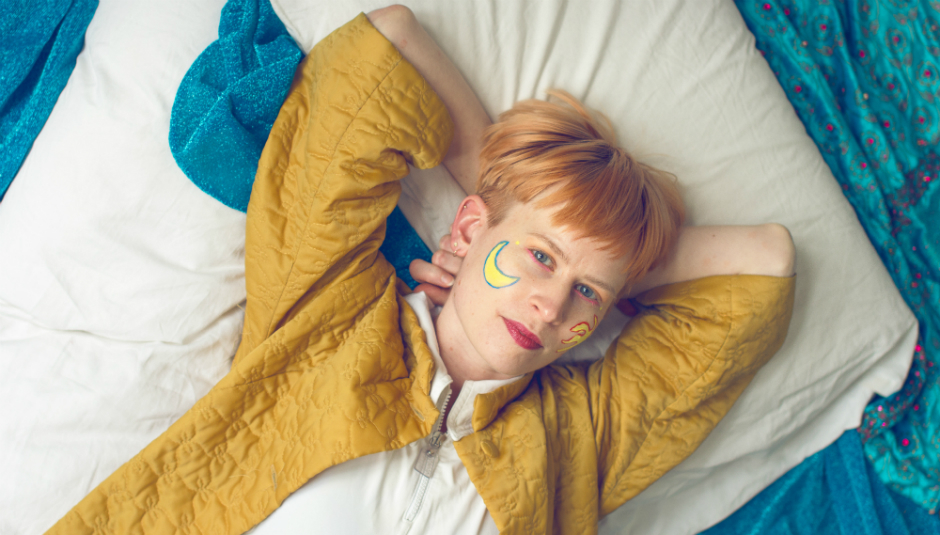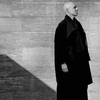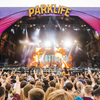“Next time we’re playing together, you can perform as long as you want”, Jenny Hval assures Ariel Kalma. The latter, a French new age pioneer who now resides in Australia, just spellbound The Hague’s Korzo Theatre with the most wondrous cosmic bricolage of ambient music, jazz, and field recordings of birdsong. An immersed Kalma lost track of space and time, prolonging his set a good fifteen minutes, from what was supposed to be a half-hour opening slot. Though generations apart, Hval could identify with Kalma’s mission, as hers has been similar in nature: distorting and stretching the parameters between performance and existence.
Hval, a polymathic artist as curious about her surroundings as she is headstrong, has a way of breaking down basic interactions and feelings most of us deem habitual. “In some ways, I’m responding to my wish, my hopes and dreams of being able to release my work in a less constricting way,” she tells DiS over the phone. “The sharing culture, the need to do everything by the book, it all gets a bit the same. It becomes almost like social media, because it’s so much about availability I want to make room for a different way of communicating.”
Hval’s show was relatively quotidian compared to, say, her more recent festival slots. She didn’t bring any inflatables, clown makeup, black capes, wigs or impressionistic dancers to obfuscate the scenery. This, in spite of her distinct ability to transcend esoterica with deep compassion and her coy sense of humour. Records like Innocence Is Kinky and Apocalypse, Girl shrewdly break down archaic gender effigies and patriarchy, and on her critically acclaimed Blood Bitch, Hval playfully conflated somnambulistic imagery with the female menstrual cycle. One track is called ‘Period Piece’, both a clever and delightfully crude way of letting the listener in on what would otherwise be considered too ‘avant-gardist’. Unsurprisingly, the album inspired lots of powerful personal narratives with Hval seemingly content in her role as a transparent wellspring for those very narratives.
In recent years, this has served her well. That being said, one of the most striking moments during this seated performance was actually very understatedly human. Midway through, she walked to the centre of the room with frequent collaborator Håvard Volden. Here, they took their phones out and started manipulating soundscapes from their speakers into their microphones. Sometimes, Hval and Volden would push their mics vigorously against their handheld devices; bearing witness to this, it felt more like voyeurism towards a form sexual intercourse than cerebral fiddling with technology.
Hval recently did a performance and workshop at Durham’s Moogfest, along with Volden and performance artist Orfee Schuijt. At the time of this interview, I ask her about the subject she has chosen for the workshop. “There is no subject,” she replies. “It’s more like, ‘Let’s just gather a performance!’ We’re just going to be with people for an hour and see how it can influence the show the next day. I don’t have a lot of experience with workshops, because I don’t have a craft. There’s nothing I could do that I could teach. So I’ll just have to do something else. But that’s been a big positive, because (the workshop) is just an hour. So… just being with people seemed like a good idea.”
The whole danse macabre with props and dancers worked well during the Blood Bitch run. But as of right now, Hval is looking for new ways to stretch both imagination and physical space, without veiling so much behind vivid impressionism. Just her presence in a room should be sufficient to make a connection to the audience. Hval admits that’s a tricky balance to accomplish, especially being a naturally shy individual herself.
“On one hand I’m a shy performer, but I always make an effort to pull the audience into it. I don’t work well in the bubble situation. I mean, I like to bring people into my bubble other than not caring what they say or do. I think I care a great deal about the narratives others create around my work, and other people’s work. I’m interested in how we treat art, and what listeners get out of the work. Sometimes that’s stronger than the work itself, it can mean so much to people. I’m not sure whether I’m responding to anything in particular, but I guess I’m always responding to something. A lot of an artist’s work these days in the music world is about constant engagement with the audience and social media. Which for me, well – it’s not that I hate all of it, but it’s not the platform I want to speak in a personal tone to. Through my music, I can respond better to both criticism and appreciation of the actual music itself.”
In places with a strongly defined hierarchy, like big festivals, reaching people becomes harder for an artist like Hval, who thrives on the fluidity of performance. “For the audience too,” she says. “You buy your ticket, so when already there something is established. There’s a distance from the inside as well as from the outside on stages that are makeshift sold for the festival for outdoor space. You don’t have time to do a soundcheck as a performer… there’s no weird basement you can go into to find lots of old furniture or plastic plants, or other weird real-life objects. So that means you’re going to have to bring everything with you. I love performing in small spaces sometimes, where you can go into the audience and sit down with them. So if I give you the impression that something was trying to leak into something else – something beyond a music concert – that’s really nice to hear.”
Keeping the reality of her private life out of direct view isn’t as simple, however, once a performance gets more and more stripped down. “Because the personal stuff’s all up there on stage anyway. It needs to become something else, something that can exist on a stage. But yeah, I do think about being in other rooms a lot of times. Sometimes it’s like trying to evoke the very intimate zone between you or your computer. Or you and your phone. You and a very close friend. Or someone weird sitting too close next to you on the tram. These very dynamic intimate spaces: it’s more the spaces I think about when I perform rather than anything specific about me. But I think that’s as personal as bringing in my life story between the songs or something.”
Considering Hval’s Hague show in hindsight, this suddenly makes a lot more sense. Still somewhat jet-lagged from her brief tour in the US, Hval and Volder opted to perform her brand new EP The Long Sleep in reverse. Unlike her previous releases, which often dabble in conceptual or fictitious subject matter, The Long Sleep feels like a more direct transmission from artist to listener. Hval already mentioned how she allows performances to bleed into one another; to keep them spontaneous, more open-ended. This translates directly into the EP’s make-up: the astral dream-pop of ‘Spells’ dissolves as it leaves its earthly atmosphere, its matter spread out into a more fluid, amorphous ambience.
Hval elaborates on this further: “I think the words The Long Sleep came from the title of a script, and that evolved into something else. Sometimes I just pick words, like anyone would do if they sing in the shower… you can make anything into a mantra if it sounds good to sing it. But there’s a reason why it’s not changed, it’s still on the EP, which got its name from that moment… that was the moment where I went from trying to compose separate songs, and just take one song and explode it into this trip to the universe. I wrote ‘Spells’ first, and initially, I wanted to make a remix EP.” In a way, that’s kind of what The Long Sleep has ended up becoming anyway, only with Hval as its sole remixer. “There’s really only one composition on the EP, all the songs are the same song that developed into different directions. So melodic elements are very much the same, and lyrics that relate closely to one another. So they’re very connected, but they ended up like different parallel universes.”
Hval composed everything predominantly on her own, but gave the session players specific cues on how to navigate the music. Like with previous Hval recordings, you get the sense that The Long Sleep could be a proxy for something else. Death? Depression? Disassociation? One lyric finds Hval describing a Disco Ball, as “a constant reminder that not even you belong to you”. It’s generally an object we associate with parties and celebration, to mesmerize and dull us into creatures of bliss. But it can also be interpreted as a fractured object constantly reflecting images a thousand times per second. Which is actually painfully true engaging with social media, for instance, when your Facebook algorithm brings up images of deceased relatives and friends as if they’re still with us.
“Oh for sure, the long sleep could refer to death,” Hval answers when asked about what the EP title could symbolize. “The phrase You will not be awake for long is a comforting line of saying ‘Well, at least we won’t be here on earth very long.’ Music can be a space for me anyway, I think its universe is a space… a different way of perceiving the world, so you can feel good about your life ending, or feel better about the fact that you’re going to die someday. Maybe it’s a bit about that acceptance to art, that there can be other ways to think about existence. But I didn’t really express that into the lyrics so much, except for maybe small phrases.” As she so often does, Hval’s thought process takes a refreshing left turn from abstract to concrete. “I guess I wanted to translate that feeling of Spotify turning into a galaxy. It doesn’t deserve to be transformed for sure, but trying to turn this information overload into more of a trance, a silent blur.”
Making Spotify a tangible universe, well, you can imagine how lonely it would be for a “non-mainstream” artist like Hval roaming there, between all the trite coffeehouse cover compilations and viral hits. Her approach isn’t exactly geared towards making Spotify Chill Playlists. In The Hague at one point, Hval and Volder played a computer voices sum-up of the word ‘chill’, directly digging at the act of passive listening. “I was actually thinking about Spotify a lot when I was writing this EP, because I’ve been reading so many great, very critical articles about Spotify’s algorithms at the time. I was composing this late last year, so I mention Spotify being outer space and me being an astronaut speaking back to earth. But it’s a very personal outer space, the phone and computer world of our daily interactions – so I was imagining I could create a situation where I get to speak directly, where I could break the fourth wall, or at least the wall between album and listener.” One of the articles Hval mentions as a creative trigger was Liz Pelly’s The Problem With Muzak.
Listening to The Long Sleep from start to finish, fully immersed, is simply heart-wrenching and captivating. It’s almost tacky nowadays to say “This song speaks to me”, because often times, there’s a disconnect between what the writer means and what the listener interprets. But The Long Sleep never gives you this impression: it’s as if Hval has made this album just for you. Though the stripped piano motif of ‘Spells’ is solemn on ‘The Dreamer Is Everyone In Her Dream’, she digs deeper into the disco ball metaphor: “It’s nice because it doesn’t does like you’re broken / What breaks the light that shines on you”, and later, “Your broken heart is visible from the outside / It means you can take multitudes”. For people who’ve suffered long-term depression, this stuff hits so close to home: to never show your emptiness, to always try be that beacon for others whilst neglecting yourself. But the music’s compassion seems to be futile, as the song breaks free from its comforting umbilical cord and nosedives into an infinite darkness.
Hval’s piercing chants of “This is the long sleep!” are nothing like a shushing lullaby, more like a moment of anguish: don’t leave, don’t let go! But slowly, the music drifts into a nothingness that’s both calming and frightening. The title track is a long, drifting ambient piece, with wood blocks serving as cosmic debris, and Hval’s eerie voice only audible sporadically in the far distance. Then, after what could seem like minutes to days, she snaps back into the tangible world with ‘I Want To Tell You Something’, a candid spoken word segment:
“What am I doing here? Am I communicating? Am I promoting? I just want to tell you something. There should be something I could tell you, there should be something I could do to reach you directly, but there is nothing useful in the way we define ‘you’, or ‘me’. There should be something I could tell you, there should be something I could say directly without lyrics and melody. Maybe that’s what I’m trying here. Something else than lyrics or melody. It’s not the words. It’s not in the rhythm. It’s not in the streaming. It’s not in the ‘message’. It’s not in the product. It’s not in the algorithms. It’s not something you decided. It’s not something they decided for you. I want to tell you something. I just want to say: Thank you. I love you”
In the past, Hval has been critical of the word ‘love’ within the confines of capitalist structures, particularly in this feature in SPIN two years ago. So telling the listener she – as a musical entity – loves the listener, this is at the very least interesting.
Hval says she has difficulty using the words ‘I love you’ within “a romantic context. You never know what will happen, but I’m not the type of lyricist who writes love songs. I think the words ‘I love you’ can relate to so much. Even if you’re like me, someone who is always trying to look beyond clichés. I like to hate clichés, I always get angry at romantic comedies and such, clichés around romantic love and friendships. But the words are always sort of touching in a way. They hit very deep within us, and hearing them always reaches us, even in context we might not like, they can also relate to something universal and personal within us.”
She reveals that ‘I Want To Tell You Something’ came out of an improvised writing session. “I don’t use those words easily in a musical context. It was more about saying to the listener right now at this very moment: ‘You have worth’, and letting the music know that it loves its listener, that the listener has a lot of value. Kind of in a panic state, it’s trying to reinstate value into art. It seems that today with algorithms and the Internet, art has no value. And I wanted to talk to the listener instead, giving value back for really listening to the music. That would be my utopia: a place where the music talks back.”
Along with The Long Sleep this year, Hval recorded the EP Feeling for Håvard Volden’s project Lost Girls. The first track, she monologues in real time from a very isolated transient place – in a van during a tour – witnessing the complexities of the daily world almost like a Twitter feed. She reflects, she second-guesses, bursts into lapses of optimism. Hval – who transfers her thoughts and concerns through such a vast confluence of art, literature, film and sound – has always bristled at personal catharsis, now actually confides to the listener that she listens to her own music: “The voice I'm listening to is my own / And some of those times I cry”.
Though momentarily downcast, she eventually rallies:
”I want us all to cry together! To let loose, to let go of ourselves In the empty clubs and on the dancefloors On the parking lots, on the highways And through the speakers…
Though none of us might truly be free in a world overrun and oppressed by algorithms and capitalist structures, Hval may have found a tiny wormhole in space to reach us, to communicate and share with us directly. Even though at that very moment, she might be somewhere thousands of miles apart. “It’s nice to remind people, with any type of art, that this is what came before social media. We just didn’t have the immediate exposure and commenting. Communication has a long history, there’s a still a great need to see things in a different zone. I do get influenced by what it means to be human in this age and discuss that with the listener in a certain way. That’s what makes music more relevant to make for me… and to listen to.”
The Long Sleep is out now via Sacred Bones. For more information on Jenny Hval, including forthcoming tour dates, please visit her official website.
Photo Credit: C Tenvik






















